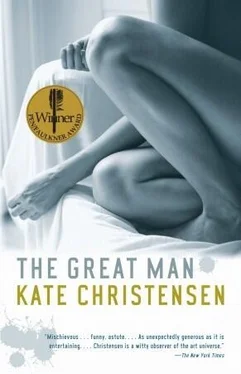“To change the subject, what do you most regret doing or not doing in your life?” Paula asked.
“I regret,” said Maxine, “and you can print this, that I let the love of my life, Jane Fleming, get away about thirty years ago. My second-greatest regret is that I wasn’t more famous during my lifetime. I wish I had seized and pursued and hunted down the two things I most wanted and failed to secure for myself. Self-denial is pointless. Niceness is ridiculous. You’re a very smart young woman, to know this already.”
“You think I’m not nice?” Paula asked, dimples flashing.
“I think you’re perfectly nice, when you want to be. But if someone gets in your way, I imagine you would not stop to worry about anyone’s tender feelings. If something is in your way, it has to be gotten out of your way. You want to be famous, and that’s what it takes. There is no other way.”
“I’m not so sure about that,” said Paula.
“You live where? New Jersey?”
“Yes,” said Paula.
“In Montclair, I understand,” said Maxine. “Nice town. And you’re married?”
“Yes,” said Paula.
“To a white academic, am I correct?”
“My husband teaches philosophy at Rutgers, yes,” said Paula. “And he is white. But Irish.” She laughed. “The niggas of Europe.”
“Oh,” said Maxine, “Europe has many different kinds of niggers. So you’re married; I hope happily on the whole, and if so, I would say, hold on to him no matter what, because when you’re old, you’ll be glad you did. It is unnatural to grow old alone. I envy those lucky people who have longtime mates who remember them when they were young, remember them through the years.” She took a deep breath, put a hand on her chest. “Speaking of old age, my dear. We have taken up enough of each other’s time. In other words, I need to lie down now.”
Paula reached over and turned off the tape recorder and, without asking permission, went over to look at the portrait. She stood just behind Maxine, gazing. Maxine stiffened, suddenly worried.
“Oh my God,” Paula whispered into Maxine’s ear. “Girl, you are good. ”
Maxine felt herself melt a little, felt her heart warm and tender in her own chest, almost like an ache. “Thank you,” she said.
“This is great, Maxine. I feel honored….” Paula kissed Maxine’s cheek, cupped her other cheek in one hand, and bumped her head briefly against Maxine’s. Maxine sighed like a small child being caressed by her mother, except this was Paula Jabar, and she was naked.
“I’ll get dressed and go now,” said Paula, “and let you rest….”
When Paula had dressed and gone, taking her perfume with her, her bright brown eyes, her flowing gestures and shimmering outfit, Maxine went in search of Katerina. She found her crouched over a box of drawings at the back of the studio.
“Did I say everything all right?” Maxine asked her.
Katerina looked up from the box. There was a smudge of dust on her chin. “I didn’t listen to everything,” she said apologetically. “But I could tell you were brilliant.”
“Katerina,” said Maxine, “I told you a while ago, you are the executor — or should I say executrix — of my will.”
“I know,” said Katerina. “When you die, I have to make sure your will is honored, and call your lawyer, and see that your ashes are thrown into New York harbor.”
“But what you don’t know is that I’ve left you everything,” said Maxine. “All of my paintings, my dog, this loft, and the money in my bank account. You can have all of it, and my paints, and my journals, and everything else. All I ask is that you walk Frago twice a day and make sure my retrospective is done right. Work closely with Michael Rubinstein. You know more than anyone else the work I’m most proud of.”
Katerina had stood up during this little speech, and now she grasped Maxine’s hand and said, “Are you going to die?”
“Yes,” said Maxine, then added through her bone-weary muzziness, “eventually I am, so I wanted you to know all of this from me before I go. You’ve been an absolute angel to me these past few years, and I can’t think of anyone else I’d rather leave it all to.”
“What about the tefillin?” Katerina asked.
“Give them to Abigail. Let her decide whether or not that little kid should get them. Everything else, all my crap, what little money I have, you keep. You can live here or sell the place and move somewhere more interesting. I don’t care.”
Katerina said, “I don’t deserve this.”
“Now I’m going to go lie down,” said Maxine, letting her hand go. “If I’m not up by the time you leave, don’t forget to come and wake me.”
“I won’t forget,” said Katerina, looking dazed.
In her bedroom, Maxine kicked off her shoes and flopped onto her bed with a grunt of relief. She lay on her back and looked up at her ceiling. Several things flitted through her mind at once — regret about a few of the things she’d said to Paula this afternoon, which sounded fatuous when she replayed them in her memory; an image of her niece Ruby at the dog run, looking so much like Oscar; a sudden craving for vanilla ice cream; a brief memory of Oscar as a young man walking down Broadway snapping pictures of a young Maxine, who was thirsty and hot and out of sorts; a momentary fear that Frago needed to go out and was suffering from an overfull bladder; a sudden recollection of the newsstand on Houston Street her father had always taken her to every morning, where the old Armenian always cackled at little Maxine as he handed her father his newspapers, one in Yiddish, one in English. The Armenian had lost his front teeth and half his fingers; his cheeks were bristled with black whiskers like spiders’ legs. Every morning, he had given Maxine a lollipop. He was like the troll who lived under the bridge in the old story. With the image of the Armenian handing over the lollipop, eyes bulging with frightening goodwill, as vivid in her mind as if it were happening right that moment, Maxine drifted into a deep and dream-filled sleep.
Henry Burke and Ralph Washington stood alone together at Maxine’s retrospective with glasses of red wine. They were the only ones in the broad hallway of the Michael Rubinstein Gallery, where Helena hung next to Paula. People were just starting to arrive; a few early birds milled about, examining Maxine’s new series of black-and-white abstracts in the main gallery. Upstairs in the smaller galleries was a selection of the best of her older works.
Both men wore tuxedos. Henry’s was rented and fit him imperfectly; Ralph had recently bought his, and wore it with dapper enjoyment. Henry looked peaked and ill at ease; he had lost a good deal of weight over the past months. Ralph, on the other hand, had gained a few pounds, and had achieved a courtly, gleaming plumpness, which oddly became him.
“Well,” said Henry, not looking Ralph in the eye. “Maxine’s work looks good, all hung up like this. I had wondered how it would be, in the aggregate. And these two portraits are great in their own right.”
“How’s your book?” Ralph asked.
“It’s coming along,” said Henry, not altogether honestly. “There’s so much rich material to mine.”
In truth, he was flummoxed by the richness of the material he’d amassed. And distracting him from writing the book was the fact that he had somehow managed to fall into a sexually passionate love affair with Ruby Feldman. Adultery was exhausting, he found; he didn’t have the stomach for it. He was on the verge of mental collapse at the moment. His wife, Melanie, was wandering around in the main gallery. Soon, she and his mistress would be in the same room. He thought he might faint, throw up, or both at once.
Читать дальше












